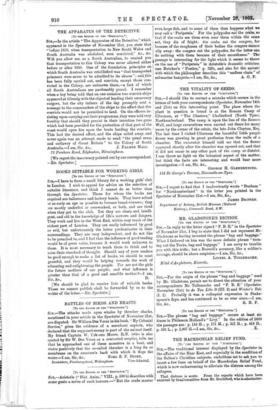THE APPARATUS OF THE DETECTIVE.
ere les EDITOR OP THZ -nrscraToa.-j Sra,—In the article "The Apparatus of the Detective," which appeared in the Spectator of November 21st, you state that "before 1850, when transportation to New South Wales and South Australia was abolished, men convicted," &c., &c. Will you allow me. as a South Australian, to remind you that transportation to this Colony was never allowed either before or after 1850. One of the foundation principles on which South Australia was established was "that transported prisoners were never to be admitted to its shores "; and Shis has been fully carried out, and convicts, except thole Con- victed in the Colony, are unknown there,—a fact of which all South Australians are pardonably proud. I remember when a boy being told that on one occasion two convict-ships appeared at Glenelg with the object of landing their unsavomy cargoes, but the city fathers of the day promptly sent a message to the commanders of the ships to the effect that the convicts would not be permitted to land. On the officers in- sisting upon carrying out their programme, they were told very forcibly that should they persist in their intention two guns which had been provided for the protection of that part of the coast would open fire upon the boats landing the convicts. This had the desired effect, and the ships sailed away, and never again was an attempt made to send "the penal scum and outlawry of Great Britain" to the Colony of South [We regret the inaccuracy pointed out by our correspondent. —ED. Spectator.]


















































 Previous page
Previous page